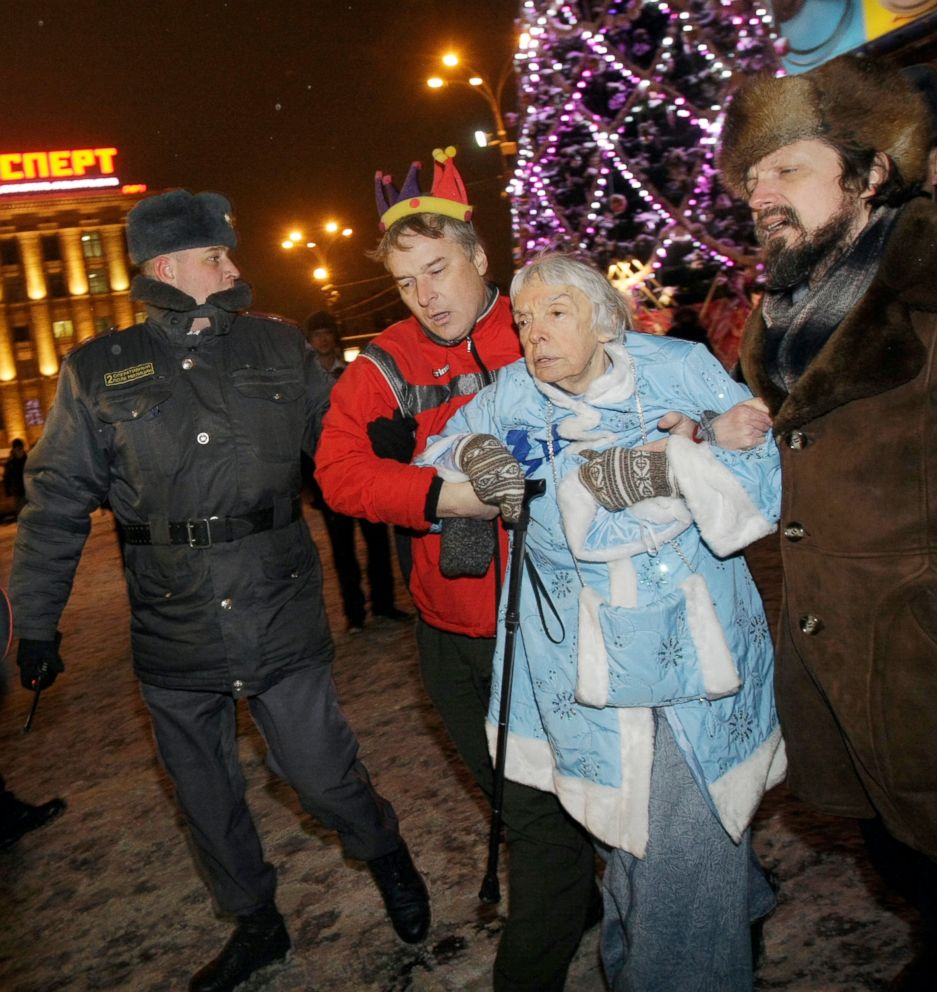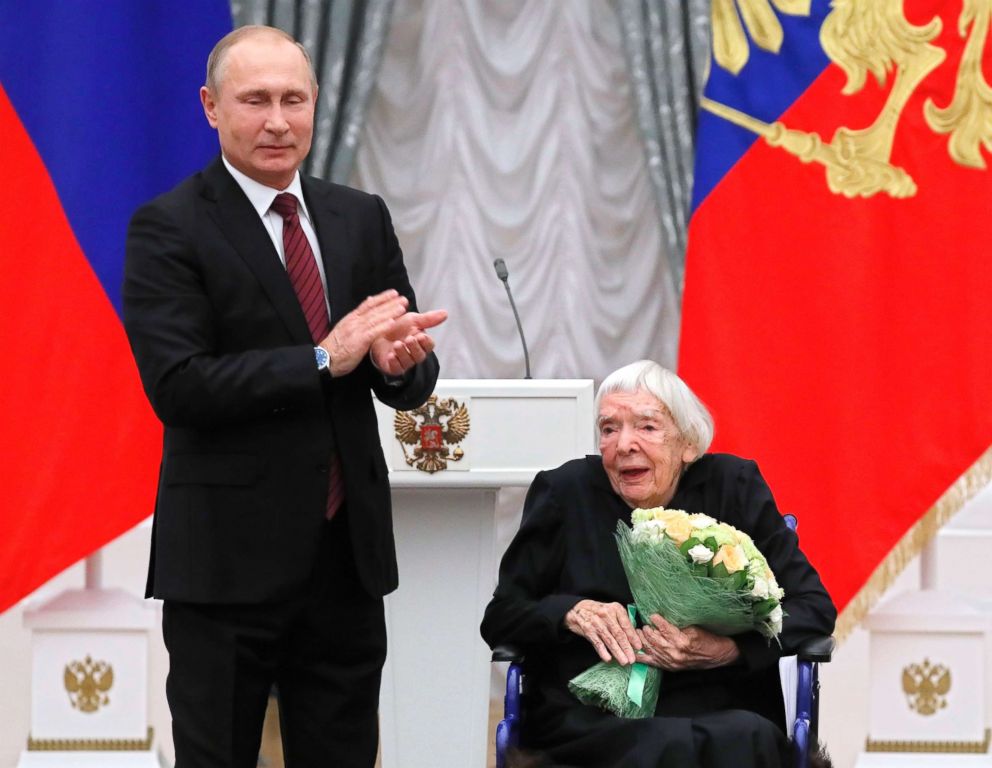Legendary Russian human rights activist Lyudmila Alexeyeva dies at 91
Lyudmila Alexeyeva, a revered human rights activist, died Saturday in Moscow.
Moscow -- Lyudmila Alexeyeva, the doyenne of Russia's human rights movement and one of the country's most revered activists, has died.
Alexeyeva, who for decades exposed oppression under the Soviet Union and then post-Communist Russia, was so respected that even President Vladimir Putin found it necessary to show her deference.
A veteran of the celebrated, Soviet-era dissidents of the 1970s, Alexeyeva helped found the USSR's first human rights organization, the Moscow Helsinki Group, which chronicled abuses committed by the Communist authorities.
After Putin came to power and authoritarianism in a softer form returned again to Russia, Alexeyeva continued her campaigns. She led demonstrations well into her 80s, standing with protesters as they were confronted by riot police and condemning the crackdown on political freedoms and expression under Putin.
Alexeyeva endured countless arrests and KGB interrogations. She was later exiled, too.
She was 91 years old when she died Saturday in Moscow.

Known for her impish sense of humor, Alexeyeva, at a demonstration in 2009, was detained and placed in a police van while dressed as the Russian equivalent of a Santa's helper.
She was 82 years old at the time.
Alexeyeva, who died Saturday in a hospital in Moscow, continued to work until her death, meeting with victims and pressing authorities on political cases.
Alexeyeva’s decades of insistence on the essentialness of human rights and unflagging defense of victims of political oppression through her country's tumultuous recent history led some to refer to her as “Russia’s conscience,” a title her some of her colleagues said she would have dismissed.
Rights groups and political leaders hailed her following her death. Human Rights Watch in a statement called Alexeyeva a “towering figure for human rights activists everywhere.”
Alexeyeva’s status meant the present-day Russian authorities were careful in their treatment of her and at times sought to co-opt her. Last year, Putin visited Alexeyeva at her home to wish her a happy 90th birthday. She used the occasion to try to strong-arm Putin into promising to pardon a senator convicted in a controversial case.
Leonid Ragozin, an independent journalist, on Saturday wrote Alexeyeva had told him during a 2012 BBC interview that she would like to die in prison, just to annoy Putin.
On Saturday, Putin sent a telegram of condolences to Alexeyeva’s relatives, praising her “invaluable personal contribution” to the development of civil society in Russia.

Alexeyeva was an anchoring point in Russia’s fractious dissident movement, universally admired for her moral authority and efforts to defend those targeted for persecution. She was known for her personal involvement in political cases, attending court hearings despite her physical frailty.
“She wasn’t a last hope, but rather a person who always knew what to do,” wrote Anna Gaskarova, whose husband Alexeyeva had supported after he was jailed for three years for taking part in a political demonstration in 2012. Alexeyeva had hosted a dinner every year for a group of people arrested in the same protest, known as the Bolotnaya Affair.
“Such people don’t die,” Gaskarova wrote in a tribute on Instagram.
Much of the respect stemmed from Alexeyeva’s fearlessness in the face of power. She was raised during the years of Stalinist terror and as a teenager worked as a volunteer laborer during World War II.
In the 1960s, she volunteered to type the Chronicle of Current Events, a banned journal that tracked judicial violations by Soviet authorities. After she co-founded the Moscow Helsinki Group in 1976, she was forced into exile, spending 16 years in the United States, where she worked for a time for the U.S. government-funded Radio Liberty.
She returned to Russia in 1993.
In the Putin-era, she was an undeniable icon, even as it was one that was often unwanted in Russia as aggressive nationalism and intolerance of dissent surged.
Kommersant, Russia’s leading independent newspaper, wrote in its obituary on Saturday that Alexeyeva's death had deprived Russia of “a very important symbol.”
“This symbol annoyed a lot of people in Russia, but its existence meant a lot for how our country looked -- from inside and without,” the newspaper wrote.
An unceasing critic of the Kremlin’s growing repressiveness, Alexeyeva also sought to find ways to communicate with Putin's government. She joined the Kremlin's presidential human rights council but left it in 2012 over concerns it was becoming a puppet body.
She took a long view of Russia's current slide back toward authoritarianism, calling it the inevitable reaction to the revolution that ended the USSR. But she lamented that most Russians showed little concern for the repressive turn, seeing that as a failure of her own rights movement.
Kommersant on Monday published an address, which Alexeyeva had written from the hospital to the Moscow Helsinki Group's annual conference, which took place Sunday. The newspaper said the text could be seen as her political testament.
“It seems to me there are not easy times ahead," she wrote. "We all see very well how weak is civil society, the culture of law and democratic institutions in our country.”
She wrote that she believed they had underestimated the lingering effect of Russia's totalitarian history and that the rights movement had not always found the right arguments or style to change people's views.
She also warned the human rights movement against becoming associated with one political side, saying its most important task now was to find people who can spread its values to a much wider audience.
She ended with characteristic optimism.
“It’s very difficult, but it’s necessary. Believe me, I know what I am talking about,” she wrote. “When we started our difficult path in the defense of human rights, we had far less grounds for optimism than today, but we believed in our hopeless business! I wish you such belief and also strength and luck with all my heart!”




